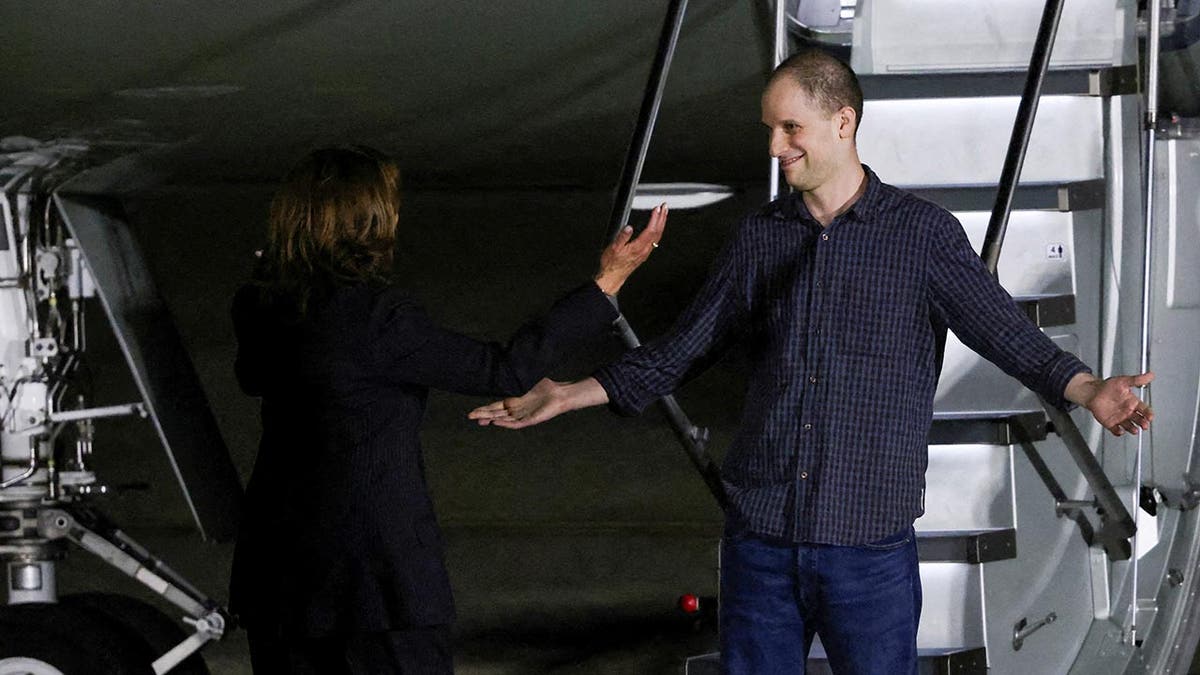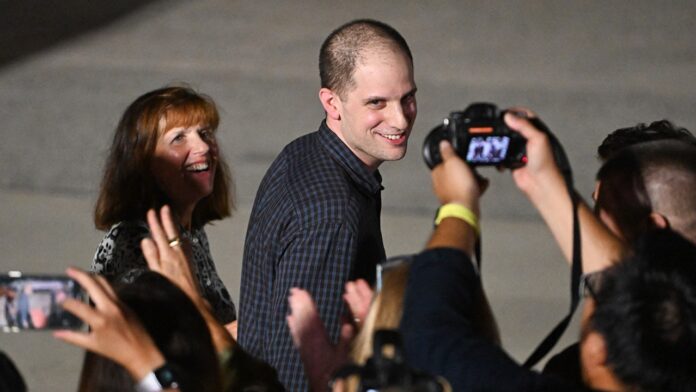The Wall Street Journal’s Evan Gershkovich “never stopped reporting” during his grueling imprisonment inside Russia. On Thursday, his name showed up where he always preferred: as the author of a story, not the subject of one.
Gershkovich penned a first-person account about identifying the man behind the Kremlin spying operation that brought about his ordeal and was there when he was set free.
“When I was arrested by Russia’s security forces in 2023—the first foreign correspondent charged with espionage since the Cold War—I never stopped reporting,” Gershkovich wrote in a story that included collaboration from several other Journal reporters. “On my release I set out to identify the man who had taken me, and to learn more about the spy unit that had carried out his orders.”
Working with other Wall Street Journal reporters who were asking similar questions throughout the nearly 500 days he was held prisoner, Gershkovich reported that the “man behind the curtain” was Lt. Gen. Dmitry Minaev, who runs Russia’s Department for Counterintelligence Operations, known as DKRO.
BEHIND THE SCENES OF THE PRISONER SWAP TO FREE WSJ REPORTER EVAN GERSHKOVICH FROM RUSSIAN PRISON

Evan Gershkovich, who was released from detention in Russia, is greeted by U.S. Vice President Kamala Harris as he disembarks from a plane at Joint Base Andrews in Maryland, U.S., August 1, 2024. (Kevin Mohatt/Reuters)
“It is at the very core of Putin’s opaque wartime regime. The story of how it got there reveals much about how Russia’s autocratic system became entangled in a broiling conflict with the West,” Gershkovich wrote.
Gershkovich said the DKRO accused him of being an agent of the CIA, a claim that lacked any evidence and was called absurd on its face by the United States, but it was enough for Russia to hold him indefinitely. The American-born journalist, whose parents are Russian immigrants, didn’t know at the time he would immediately become one of the most famous people in the world.
He was arrested in March of 2023 while reporting in Yekaterinburg, the fourth-largest city in the country. He was eventually taken to the notorious Moscow prison Lefortovo, the site of many executions during the Great Purge under dictator Joseph Stalin and still a place designed to psychologically isolate dissidents and suspects.
“It was at Lefortovo that I came to understand the power of the shadowy force that had taken away my freedom,” Gershkovich wrote.
The Journal’s reporting revealed the secretive DKRO is key to Russian President Vladimir Putin’s repressive regime and behind such moves as arresting Gershkovich, ex-Marine Paul Whelan and WNBA player Brittney Griner to create leverage for retrieving figures like convicted Russian hit man Vadim Krasikov and notorious arms dealer Viktor Bout.

Wall Street Journal reporter Evan Gershkovich stands in a glass cage in a courtroom in Yekaterinburg, Russia, Wednesday, June 26, 2024. He was freed in August in a prisoner swap. (AP)
Minaev was present on Aug. 1 when Gershkovich, Whelan and a host of others were freed in a massive, complex prisoner swap involving the United States, Russia and Germany.
The plight of Gershkovich, who turned 33 in October, received significant media attention throughout his imprisonment, and President Biden even mentioned him during his State of the Union address earlier this year.
JOURNALISM COMMUNITY RALLIES AROUND RELEASE OF WSJ’S EVAN GERSHKOVICH: ‘CHAMPAGNE POPPING IN THE NEWSROOM’
He was convicted of his spying charges in a closed court in July and sentenced to 16 years in prison, an expected result, before being freed weeks later. Now, less than five months later, he’s reporting again, and journalists online exulted in seeing their colleague’s name in print where it belonged.
DKRO officials are highly compensated and considered the Kremlin’s “most elite security force,” Gershkovich reported. Two of his reporter colleagues were stalked while working in Vienna and Washington as intimidation tactics, he revealed.
PUTIN HIT MAN SEEN AS RUSSIA’S BIG PRIZE IN PRISON SWAP: ‘HIGH-VALUE ASSET’
At home, the DKRO has arrested hundreds of Russians on spying, collaboration and treason charges to chill opponents of the Putin regime. The Wall Street Journal report also said DKRO was behind a purge of the nation’s defense ministry as Russia’s invasion of Ukraine faltered, arresting officials for corruption, and intelligence officials warn it’s planning malign acts abroad to facilitate the war.

Russian President Vladimir Putin listens to Moscow-appointed head of Russian-controlled Zaporizhzhia region of Ukraine, Yevgeny Balitsky during their meeting at the Kremlin in Moscow, Russia, Monday, Nov. 18, 2024. (Vyacheslav Prokofyev, Sputnik, Kremlin Pool Photo via AP)
But its focus under Putin is primarily internal, the report said, due to the autocrat’s fixation on spies inside Russia.
CLICK HERE TO GET THE FOX NEWS APP
“One former Russian intelligence officer described an extraordinary twist: The president at one point established a counterintelligence committee to look for collaborators among the ranks of counterintelligence agencies looking for collaborators among ordinary Russians,” the Wall Street Journal reported.
